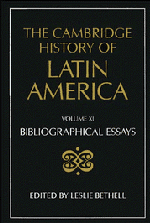Book contents
- Frontmatter
- I THE INDIGENOUS PEOPLES OF MIDDLE AND SOUTH AMERICA ON THE EVE OF THE CONQUEST
- II COLONIAL SPANISH AMERICA
- III COLONIAL BRAZIL
- IV THE INDEPENDENCE OF LATIN AMERICA
- V LATIN AMERICA: ECONOMY, SOCIETY, POLITICS, c. 1820 TO c. 1870
- VI LATIN AMERICA: ECONOMY, SOCIETY, POLITICS, c. 1870 to 1930
- VII LATIN AMERICA: ECONOMY, SOCIETY, POLITICS, 1930 to c. 1990
- 1 Population
- 2 The Latin American economies, 1929–1939
- 3 The Latin American economies, 1939–c. 1950
- 4 The Latin American economies, 1950–1990
- 5 Urban growth and urban social structure
- 6 Agrarian structures
- 7 State organization
- 8 Democracy
- 9 The Left
- 10 The military in politics
- 11 The urban working class and labour movements
- 12 Rural mobilizations
- 13 Women in twentieth-century Latin America
- 14 The Catholic church
- 15 The Protestant churches
- 16 Mexico, c. 1930–1946
- 17 Mexico since 1946
- 18 Central America
- 19 Guatemala
- 20 El Salvador
- 21 Honduras
- 22 Nicaragua
- 23 Costa Rica
- 24 Panama
- 25 The Panama Canal Zone, 1904–1979
- 26 Cuba, c. 1930–1959
- 27 Cuba since 1959
- 28 The Dominican Republic
- 29 Haiti
- 30 Puerto Rico
- 31 Argentina, 1930–1946
- 32 Argentina since 1946
- 33 Uruguay
- 34 Paraguay
- 35 Chile, c. 1930–c. 1960
- 36 Chile since c. 1960
- 37 Peru, 1930–c. 1960
- 38 Peru since c. 1960
- 39 Bolivia
- 40 Colombia
- 41 Ecuador
- 42 Venezuela
- 43 Brazil
- VIII IDEAS IN LATIN AMERICA SINCE INDEPENDENCE
- IX LATIN AMERICAN CULTURE SINCE INDEPENDENCE
- X THE INTERNATIONAL RELATIONS OF LATIN AMERICA SINCE INDEPENDENCE
- THE CAMBRIDGE HISTORY OF LATIN AMERICA
41 - Ecuador
from VII - LATIN AMERICA: ECONOMY, SOCIETY, POLITICS, 1930 to c. 1990
Published online by Cambridge University Press: 28 March 2008
- Frontmatter
- I THE INDIGENOUS PEOPLES OF MIDDLE AND SOUTH AMERICA ON THE EVE OF THE CONQUEST
- II COLONIAL SPANISH AMERICA
- III COLONIAL BRAZIL
- IV THE INDEPENDENCE OF LATIN AMERICA
- V LATIN AMERICA: ECONOMY, SOCIETY, POLITICS, c. 1820 TO c. 1870
- VI LATIN AMERICA: ECONOMY, SOCIETY, POLITICS, c. 1870 to 1930
- VII LATIN AMERICA: ECONOMY, SOCIETY, POLITICS, 1930 to c. 1990
- 1 Population
- 2 The Latin American economies, 1929–1939
- 3 The Latin American economies, 1939–c. 1950
- 4 The Latin American economies, 1950–1990
- 5 Urban growth and urban social structure
- 6 Agrarian structures
- 7 State organization
- 8 Democracy
- 9 The Left
- 10 The military in politics
- 11 The urban working class and labour movements
- 12 Rural mobilizations
- 13 Women in twentieth-century Latin America
- 14 The Catholic church
- 15 The Protestant churches
- 16 Mexico, c. 1930–1946
- 17 Mexico since 1946
- 18 Central America
- 19 Guatemala
- 20 El Salvador
- 21 Honduras
- 22 Nicaragua
- 23 Costa Rica
- 24 Panama
- 25 The Panama Canal Zone, 1904–1979
- 26 Cuba, c. 1930–1959
- 27 Cuba since 1959
- 28 The Dominican Republic
- 29 Haiti
- 30 Puerto Rico
- 31 Argentina, 1930–1946
- 32 Argentina since 1946
- 33 Uruguay
- 34 Paraguay
- 35 Chile, c. 1930–c. 1960
- 36 Chile since c. 1960
- 37 Peru, 1930–c. 1960
- 38 Peru since c. 1960
- 39 Bolivia
- 40 Colombia
- 41 Ecuador
- 42 Venezuela
- 43 Brazil
- VIII IDEAS IN LATIN AMERICA SINCE INDEPENDENCE
- IX LATIN AMERICAN CULTURE SINCE INDEPENDENCE
- X THE INTERNATIONAL RELATIONS OF LATIN AMERICA SINCE INDEPENDENCE
- THE CAMBRIDGE HISTORY OF LATIN AMERICA
Summary
Even though in recent years there has been great progress in social and historical studies in Ecuador, there is still no new general history of the republic in the twentieth century. Best of the older histories written between the 1930s and the 1950s are Oscar Efrén Reyes, Breve historia general del Ecuador, 6th ed. (Quito, 1957), and Alfredo Pareja Diezcanseco, Historia del Ecuador (Quito, 1954). To these must be added an essay of general historical interpretation by Leopoldo Benitez Vinueza, Ecuador: Drama y paradoja (Mexico, D.F., 1950). A collective publication prepared in 1980 which groups short essays on diverse aspects of life in republican Ecuador is Libro del sesquicentenario, 4 vols. (Quito, 1980–2). For a general overview of contemporary Ecuador, see David W. Schodt, Ecuador, an Andean Enigma (Boulder, Colo., and London, 1987). Among the works by the new generation of social scientists, special mention should be made of Augustín Cueva, El proceso de dominación politica en el Ecuador (Quito, 1982; rev. ed., 1988), an essay of interpretation on political and social development in the country in the twentieth century. See also A. Cueva, ‘Ecuador, 1925 1975’, in America Latina, historia de medio siglo, ed. Pablo González Casanova (Mexico, D.F., 1977). Also widely distributed is a reader published by the Instituto de Investigaciones Económicas of the Universidad Central, three articles of which are about the twentieth century: Leonardo Mejía et al., Ecuador: Pasado y presente (Quito, 1975). Osvaldo Hurtado, El poder político en el Ecuador (Quito, 1977); Eng. trans., Political Power in Ecuador (Albuquerque, N.Mex., 1980), emphasizes the socio-political process since 1950.
- Type
- Chapter
- Information
- The Cambridge History of Latin America , pp. 826 - 832Publisher: Cambridge University PressPrint publication year: 1995

